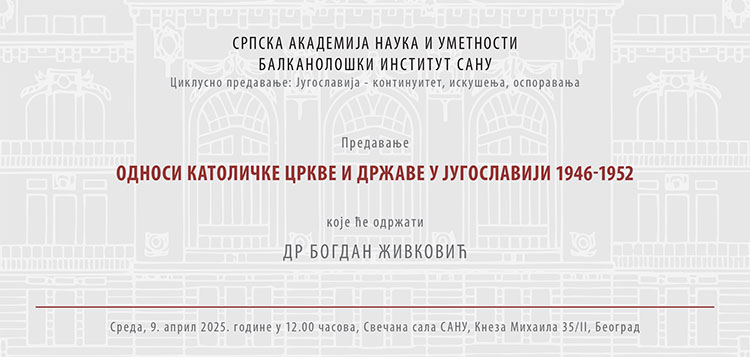Lecture ‘The Relations between the Catholic Church and the State in Yugoslavia 1946-1952’
As part of the lecture series Yugoslavia – Continuity, Trials, and Challenges, Dr Bogdan Đivković will deliver a lecture titled ‘The Relations between the Catholic Church and the State in Yugoslavia 1946- 1952 ’ on Wednesday, 9 April, at noon, at the SASA Grand Hall.
Following the Second World War, the Communist Party of Yugoslavia established a dominant position in the country’s political and social landscape. In this new order, old political and societal structures were perceived as obstacles and, therefore, doomed to dissolve or fall under state control. The Catholic Church was a rare exception to this rule. This was the only opposition which managed to resist Broz’s government’s attempts to subjugate it. This lecture will provide an analysis of the fundamental questions which defined the relations between the regime and the Catholic Church in Yugoslavia.
The lecture will shed light on what the new authorities expected from the Catholic Church, what the ideological basis of their vision was, what strategies the regime used to repress the Church, what the strategies of the Church’s resistance were and why the resistance of the Catholic Church was notably effective.
Bogdan Živković is a research associate at the Institute for Balkan Studies of SASA. He completed his Bachelor’s and Master’s studies at the Faculty of Philosophy in Belgrade, while he obtained his doctoral degree from the Faculty of Philosophy at the Sapienza University of Rome. In 2020, he defended his doctoral thesis titled Yugoslavia and Eurocommunism. Yugoslavia and the Italian Communist Party in the Sixties and Seventies. He has been employed at the Institute for Balkan Studies of SASA since January 2022. He also served as a visiting researcher at the Scuola Normale Superiore di Pisa (2023–2024). He has taken part in several international research projects and conferences.

